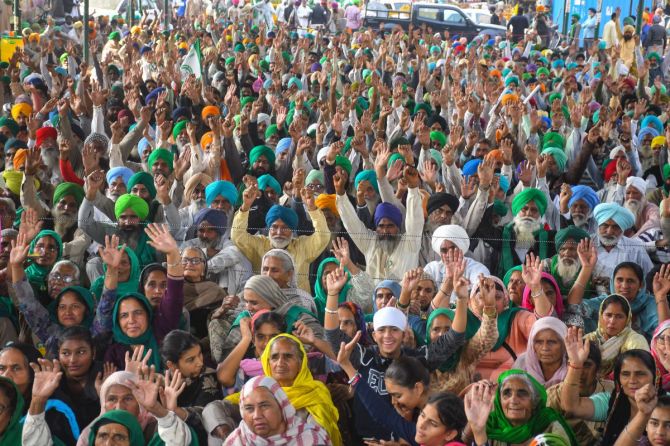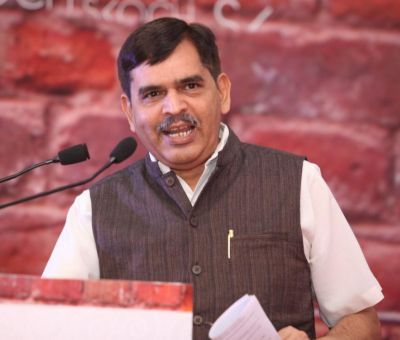'Have you seen a situation like this anywhere before, globally or in India, where a government says, okay, we are withdrawing a law because you don't want it?'

The farmers of India, especially those from Punjab and Haryana, have been agitating for a year against three farm bills passed by Parliament last year. On November 19, 2021, Prime Minister Narendra Damodardas Modi announced that the government would repeal the laws.
When the bills were passed, Professor Ashwani Mahajan, co-convenor, of the Rashtriya Swayamsevak Sangh-affiliated Swadeshi Jaagran Manch,had told Rediff.com that certain issues in the bills needed to be addressed.
Professor Mahajan tells Rediff.com's Shobha Warrier what needs to be done now.
The first of a two-part interview:
Soon after the farm bills were passed, you had said that if the farmers were unhappy, it was the duty of the people, society and the government to listen to their grievances.
Are you happy that the prime minister has decided to repeal the farm laws?
We have always maintained that the intent of the bills and the law was good as with the passage of time, with various changes occurring in society, we need to make new laws.
For example, the Essential Commodities Act. There was a time in the 1970s, we were facing huge shortage of food products.
At that time, what was needed was to make food available for the population as scarcity was the rule of the law then.
So, we had to make laws accordingly, and limits were imposed on storage.
But today we don't have any shortage; in fact, we have surplus food production.
And we have been exporting food products except for things like edible oil which we are importing.
The major problem farmers face today is storage. We need more storage facilities to be created.
But if we keep imposing storage limits, how can you create more storage facilities? So, we need to amend the Essential Commodities Act.
Then, in the regulated mandis, traders used to form cartels and exploit the farmers.
But farmers did not have any other option to sell their produce anywhere outside.
That's why the need to allow the private sector also to purchase the produce outside the mandi at the farm gate.
At that time, we had said that the farmers need to get remunerative price from the private sector also, as they are not like the government and they work only for profit.
You call it MSP (minimum support price) or any other name, but farmers should get a remunerative price.
Then, contract farming. When the farmers agree to farm for the buyers with the assurance from them that they would buy the produce, it is contract farming.
This was also a reform, but the basic flaw was that the farmers were to approach the DM (district magistrate) in case of any issue with the buyers, and the DM was made a final authority to settle the problem.
The farmers were unhappy about making the DM the final authority.
I had said then that even I couldn't approach the DM, then how can a farmer do that?
During the discussions with the farmers, the government was ready to amend the laws.
It was not that the government was not ready.
But the farmers said they didn't want the laws at all.

The farmers being the major stakeholder in this, why was it that their view was not taken when the government was making the new laws?
From our experience with the government, I have found that this government is quite receptive to ideas. I have told you this earlier too.
In this situation, why did it take so long for the government to listen to them? The farmers have been agitating for so long...
The point is, ultimately, they relented. Have you seen a situation like this anywhere before, globally or in India, where a government says, okay, we are withdrawing a law because you don't want it?
That shows the flexibility on the part of the government.
The government wanted GM to be implemented, but they listened to us when we pointed out the flaws.
The government wanted the land acquisition laws to be amended, but after discussions with us, they decided not to go ahead with the ordinance.
The government had been a supporter of free trade, and goods were coming very freely from outside the country.
But we have been saying that we need to protect the domestic industry.
And ultimately the government has taken many policy measures to increase domestic production.
Recently, the whole government machinery was gearing towards signing Regular Comprehensive Economic Partnership and we opposed it.
In November 2019, when the PM went to Bangkok, the whole world thought he was going to sign it. But he didn't.
That's why I am saying this government has been very receptive.

The government must have been listening to the Swadeshi Jaagran Manch...
Even during the talks with the farmers, they had agreed to the demands of the farmers.
If they had consulted the farmers in the beginning itself before coming out with the farm laws, don't you think they could have avoided this situation?
That's why I said, there is always a need to change the laws, and we need new laws and new legislation to move in with the times to make the lives of farmers better, and develop our farming sector.
So, now that the laws have been withdrawn, you need wider consultations and take every stakeholder on board.
Nobody should feel that only some opinions are heard, and some opinions are ignored.
In a democratic set up, there is always a chance to improve in consultations.
- Part II: 'PM has taken a sane decision'
Feature Presentation: Aslam Hunani/Rediff.com











 © 2025
© 2025